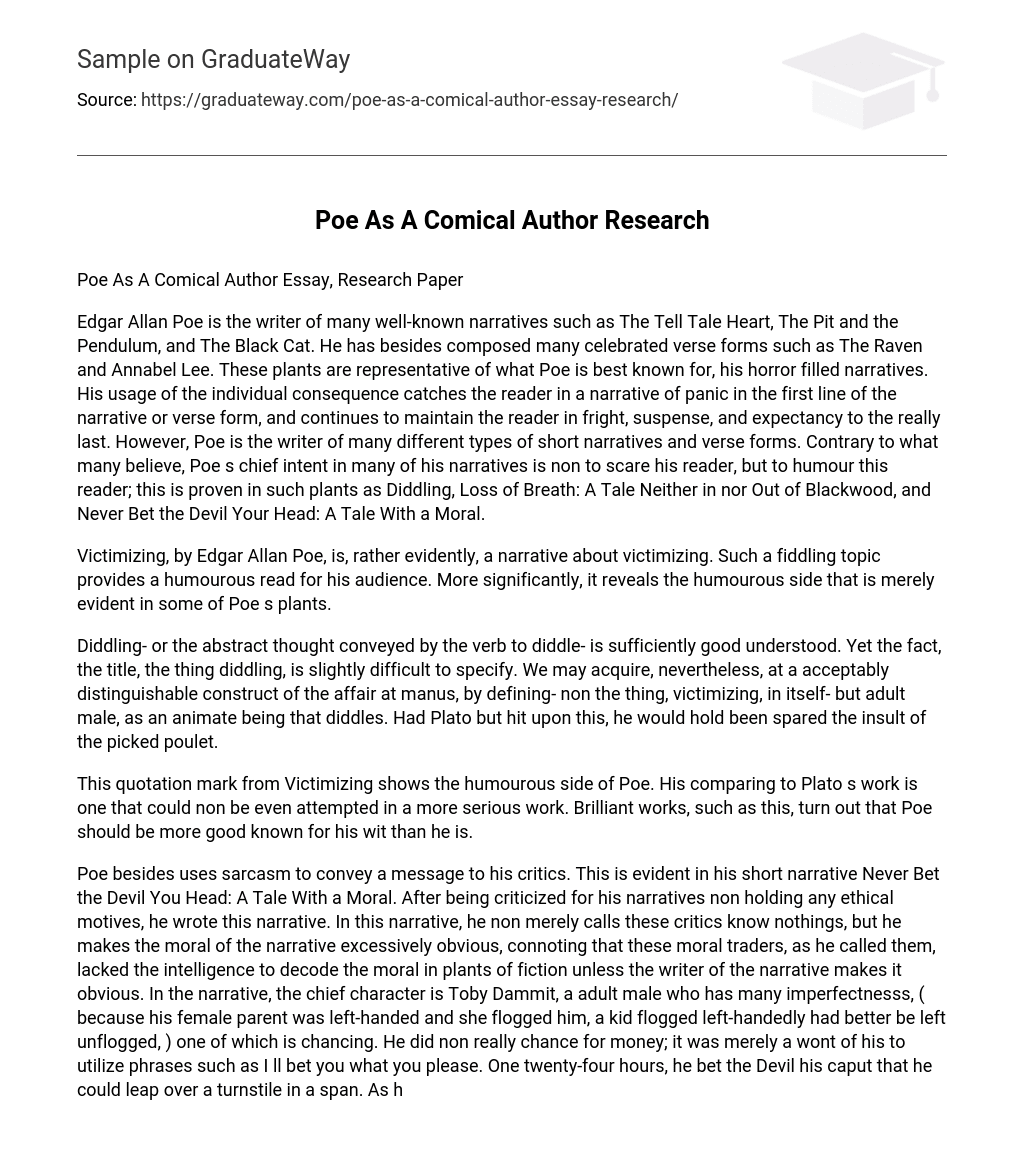Poe As A Comical Author Essay, Research Paper
Edgar Allan Poe is renowned for his compelling narratives and gripping poems, including The Tell Tale Heart, The Pit and the Pendulum, The Black Cat, The Raven, and Annabel Lee. These works epitomize Poe’s expertise in horror-filled storytelling. He captivates readers from the opening line, evoking fear and maintaining suspense until the very end. Despite this association with horror, Poe also explores various genres in his short stories and poems. Contrary to popular belief, his main intention is not always to frighten readers but to entertain them with humor. This is evident in works such as Diddling, Loss of Breath: A Tale Neither in nor Out of Blackwood, and Never Bet the Devil Your Head: A Tale With a Moral.
The story “Victimizing” by Edgar Allan Poe humorously explores the theme of victimization. This particular topic adds a whimsical element to Poe’s writing, revealing a humorous side that can be found in some of his other works.
The concept of diddling, or the abstract idea expressed by the verb to diddle, is well understood. However, it is slightly challenging to precisely define the thing being diddled. Nonetheless, we can attain a reasonably clear understanding of the matter by defining not the thing itself, but rather man as an being that diddles. If Plato had only discovered this, he would have been saved from the humiliation of the stolen chicken.
This quote from “Victimizing” highlights Poe’s humorous side, suggesting that he cannot be compared to Plato’s work in a more serious manner. It showcases Poe’s brilliance and indicates that he should be recognized more for his wit.
Poe also employs sarcasm to convey a message to his critics, which is evident in his short narrative Never Bet the Devil You Head: A Tale With a Moral. In response to criticism about his narratives lacking ethical values, he wrote this tale. Within the story, Poe not only calls these critics “know nothings,” but he also highlights the obviousness of the moral. He suggests that these so-called moral traders lack the intelligence to interpret the moral in works of fiction unless the author explicitly makes it apparent. The narrative centers around Toby Dammit, a flawed character due to his left-handed mother who punished him by flogging him in a left-handed manner. One of Toby’s imperfections is his gambling habit, although he does not gamble for money; it is merely a habit for him to use phrases like “I’ll bet you what you please.” One day, Toby bets the Devil his head that he can jump over a turnstile in a span. During this act, the narrator observes something noteworthy:
In the corner of the span’s frame, I caught sight of a small old gentleman with a venerable face. He had a very clergyman-like appearance.
The man’s appearance was meticulous. He was dressed entirely in black, and his shirt was spotless. The neckband of his shirt was neatly turned down over a white cravat. His hair was parted in the front like a girl’s. He had his hands clasped thoughtfully over his stomach, and his two eyes were carefully rolled upwards towards the top of his head.
This is clearly Satan, who establishes the terms and rules of this bet. Mr. Dammit goes first and attempts the jump, but fails to make it, and the narrator sees the old man running away with something in his apron. Mr. Dammit is discovered dead without a head. The narrator then realizes that a metal safe must have contained Mr. Dammit’s head, but the head was nowhere to be found. This story makes the moral too obvious and criticizes those who accused him of lacking morals in his stories. His use of irony to silence his critics demonstrates the power of his writing, as well as the wit that he possesses. This wit is precisely the type of story that Poe deserves to be more recognized for.
Loss of Breath: A Tale Neither In non Out of Blackwood is a narrative that revolves around a man who is fixated on proving to his wife how unremarkable she is, just a day after their wedding. However, whenever he tries to approach her, he finds himself unable to breathe. As a result, he decides to leave the country, but unfortunately dies on the train, still struggling to catch his breath. Despite being deceased, he remains aware of what is happening to him. During his autopsy, his limbs are dislocated and his head is twisted. Interestingly enough, the examiner begins to suspect that he might still be alive. From this moment onward, the protagonist ironically describes the experience of being dead and highlights the foolishness of human behavior.
I called my married woman names like wretch, harpy, and termagant on the morning after our wedding; I even referred to her as an enchantress, beldam, whippersnapper, and a sink of wickedness! Her face was fiery and detestable! I stood on tiptoe, grabbed her by the throat, and positioned my mouth close to her ear. I was about to unleash a new and stronger set of insults that would surely make her realize her worthlessness.
The abrupt change in tone in this passage demonstrates Poe’s skill in entertaining his readers. This suggests that Poe is not renowned as a horror author due to the excellence of his more comical stories, but simply because of the popularity of his more chilling tales. As a result, Poe’s talent for humor remains largely unacknowledged.
Poe’s wit deserves more recognition than he currently receives. In literary pieces like “Diddling,” “Loss of Breath: A Tale Neither in nor Out of Blackwood,” and “Never Bet the Devil Your Head: A Tale With a Moral,” Poe showcases his humorous skills. Rather than horror, these narratives focus on wit, which Poe excels at. Therefore, Poe should be acknowledged for his wit more than he currently is.





